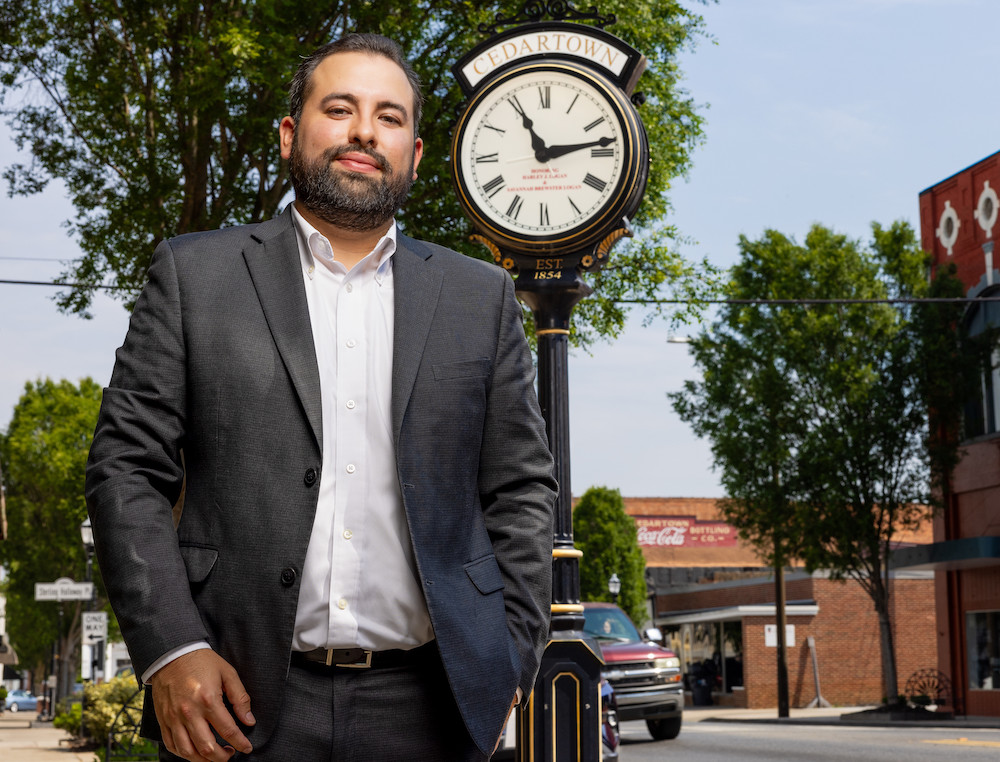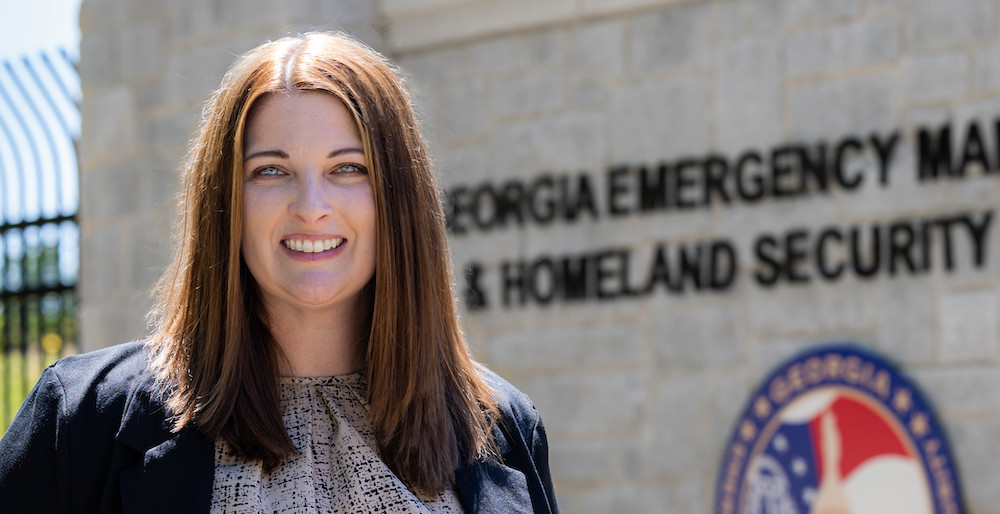

KENNESAW, Ga. | Aug 12, 2024

The son of immigrants, his parents escaped poverty in rural Mexico to provide a foundation for their children in the rolling hills of northwest Georgia. They planted roots in Cedartown, later sending their son to college where he flourished in a new environment.
Galvanized by that experience and his desire to give back to his community, Guzman now serves as his hometown’s first city manager of Hispanic descent. Sitting in his office inside the Cedartown Civic Complex, he rocks back in his chair and counts his blessings two-fold.
“I was blessed that my parents gave me the American dream and allowed me to pursue college because it helped me grow out of my shell coming from a rural community,” said Guzman, who earned a Master of Public Administration (MPA) degree from Kennesaw State University in 2019. “And KSU blessed me with the knowledge and confidence to do my job well.”
Applying learning to careers
Guzman’s story is one of hundreds that have amassed over the first 30 years of Kennesaw State’s MPA program. Launched in 1993, the program prepares public servants for leadership and administrative positions in government and nonprofit organizations. Since its inception, KSU has conferred nearly 900 MPA degrees, elevating the careers of professionals everywhere from city halls, to emergency management offices, to the studios of Georgia Public Broadcasting.
But beyond the direct benefit, the specialized program brings intangibles to the communities and organizations where graduates serve.
“As we look back on the last 30 years and think about how many students have come through the program, I’m taken by the thought of how others reap the reward from their experience,” said Madinah Hamidullah, KSU’s MPA program director. “These are people who are going into public service – many of them already holding jobs in the public sector – and they can immediately apply what they learn to improve service quality. If we attempt to count how many lives they impact throughout their careers it would be hard to quantify.”
Guzman, on the other hand, sees the benefits every day. He draws on his experience often in his day-to-day work.
When he consults the city’s finance director on the budget, Guzman calls back to lectures and assignments in his public budgeting class. Or maybe he’s asked to weigh in on a zoning case, in which he conjures up lessons from city planning field trips. Even his final project was structured to benefit his hometown. The assistant city manager at the time, he conducted extensive research on health insurance costs for rural communities with roughly 10,000 residents – about the same size as Cedartown – and offered cost-saving recommendations to the city’s insurance broker.
Although he wears his dedication to public service on his sleeve, Guzman nearly ended
up in a different field altogether. After earning dual degrees from the University
of Georgia, he set his sights on attending law school. To save up money for that plan,
he returned home and took an entry-level government position. It was there that he
met his mentor, former city manager Bill Fann.
“Under his leadership, I saw firsthand what good governance looked like and the impact his position had on the community,” Guzman said. “He said there was no guarantee that I’d be in his chair someday, but that I was still young enough to get the training should I decide to stay in government. I could see how things were improving in my city and wanted to be a part of that, so I decided I wasn’t going to law school anymore.”
Guzman set his sights on KSU on the recommendation of his future wife, a fellow KSU graduate. His girlfriend at the time, she touted the campus culture and institution’s strong reputation in north Georgia. As a student, Guzman was quickly impressed by the diversity of perspectives in the classroom.
“Not everyone was there to be a city manager,” he said. “Many were involved in nonprofits or other government agencies. You might be in the classroom with someone who works in city planning, or maybe they were looking to become their organization’s next chief financial officer. Regardless, they all had the same passion for public service, and it made the in-class experience incredible.”
Diversity of perspectives is embraced in the program, Hamidullah said. About three-fourths of current MPA students are part time, with many actively holding jobs in the public sector. However, Hamidullah said they are seeing more pre-service, full-time students joining the program with the intent to launch fruitful careers in public service. Additionally, more than half of the students in the program identify as a member of a minoritized group.
“I think that’s the beauty of the learning environment,” Hamidullah added. “People are going to bring their lived experiences with them to the classroom, and that enriches the discussion for everyone. In the public sector, you’re going to interact with people from all backgrounds with different ideologies. Having that kind of exposure in class is invaluable.”
Thinking outside the box

In 2016, Rucker-Wright was elevated to Dawson County 911 director. Seeking further advancement opportunities, she decided to enroll in KSU’s MPA program over others closer to home because of its Network of Schools of Public Policy, Affairs and Administration (NASPAA) accreditation. Her experience has empowered her to enact process improvements across her organization.
“There were times in previous roles where I felt I was performing functions because that’s the way it had always been done,” she said. “But now I’m able to step back and analyze our operations and question whether things can be done more efficiently. Every action I take can and should be for the public benefit. I owe a lot to my professors who challenged me to think outside the box, and I carry those lessons with me wherever I go.”
Lately, her travels have taken her to all corners of Georgia. In the past few years, Rucker-Wright has logged more than 75,000 miles on her car as she crisscrossed the state to meet with 911 stakeholders. She holds a key role in the overhaul of the state’s 911 system, which had seen few upgrades since it was first implemented in the 1960s. Her organization is leading the charge in establishing a new internet-based system that will be used by all call centers in Georgia, and it is her responsibility to ensure that needs are being addressed.
Like Guzman, Rucker-Wright leveraged the program to tackle issues relevant to her field. While studying abroad in Germany and France, she conducted a comparative study of legislation governing the European Union’s 112 system, which operates like the 911 system in the U.S. She has since applied those findings as she advocates for improvements stateside.
Passion for public service

Much like his fellow alumni, Huffman identified a passion for public service early in his career and has never wavered in his commitment since. Originally set on becoming an actor after attending Tennessee Wesleyan University, he was introduced to development work while serving as an admissions recruiter at his alma mater.
“I figured out pretty quickly that I wanted to have a career that was service-oriented, particularly in the nonprofit space,” said Huffman, who graduated from KSU in 2005. “I knew that furthering my education was important, and the MPA program was the right fit.”
Beyond the technical experience he gained in strategic planning and budgeting, Huffman said he also learned soft skills that have allowed him to forge strong professional relationships and grow as a servant leader.
“I learned how to negotiate, to listen to people and to leave every interaction having learned something new,” Huffman said. “I never come into the job feeling like I’m an expert at everything. Instead, I’ve learned that leadership can be found at every level, and I try to empower people in my organization to take the lead when they can. I can say with certainty that I wouldn’t be here today if I didn’t take the time and effort to attend KSU and acquire those skills.”
This article also appears in the current issue of Kennesaw State’s Summit Magazine.
Story by Travis Highfield
Photos by Judith Pishnery and Matthew Yung
A leader in innovative teaching and learning, Kennesaw State University offers undergraduate, graduate, and doctoral degrees to its more than 51,000 students. Kennesaw State is a member of the University System of Georgia with 11 academic colleges. The university's vibrant campus culture, diverse population, strong global ties, and entrepreneurial spirit draw students from throughout the country and the world. Kennesaw State is a Carnegie-designated doctoral research institution (R2), placing it among an elite group of only 8 percent of U.S. colleges and universities with an R1 or R2 status. For more information, visit kennesaw.edu.